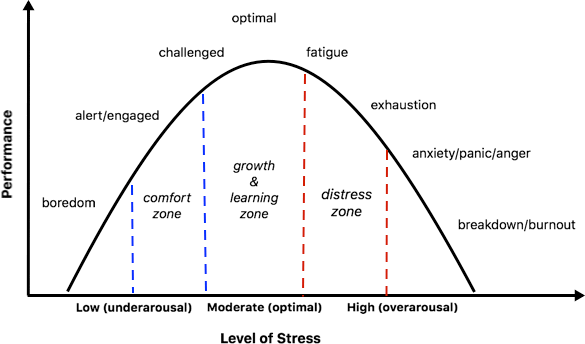February 16th, 2021
Entrepreneur and thinker Naval Ravikant recently wrote on Twitter:
"Imagine how effective you would be if you weren’t anxious all the time."
Is he right? Because some highly driven people argue that anxiety is actually their superpower. Without anxiety as a kind of spur, they feel they’d lose their drive and ambition, perhaps becoming complacent or unmotivated. “Only the paranoid survive”, as Andy Grove would say. There is some truth to this. A common cause of anxiety is stress. And stress can be a positive motivator, but only if it’s the right kind of stress and the right amount of stress. My friend Cutler Whitely recently introduced me to a concept from psychology called the Yerkes-Dodson Law, which explains how this works. Take a look at the below graph:

Finally, a parabola that is useful. It shows that with too much stress, the resulting anxiety you experience gets in your own way and your performance suffers for it. With too little stress, you’re under-stimulated and unmotivated, and likely not getting edged out of your comfort zone enough to perform at your best.
Right in the middle is the “sweet spot”, where experiencing an appropriate level of stress has a positive effect on how you perform.
Measuring Stress
How do you know how much stress is enough for optimal performance?
Harvard Business Review’s Perceived Stress Scale test can give you a quick initial idea of whether your current levels of stress are too high, too low, or somewhere towards the optimal middle.
According to Harvard professor Francesca Gino, the executives she teaches typically score around 13 on this test, while a score over 20 is considered too high.

In an environment with too much stress, you may still feel a sense of urgency, but your focus is likely scattered. You look at the score too much. Or make poor decisions that are not informed by thoughtful analysis but by a cauldron of cortisol. Thankfully, if your stress levels are too high, Gino has a few suggestions for how to bring yourself back toward the more productive median.
One strategy involves taking a page from the Stoics and only focusing on addressing stressors that are actually within your control.
If the emails piling up in your inbox are a source of stress, for example, you can agree to only answer them at set intervals throughout the day or always in a specific order. Research suggests executives with more responsibility in an organization are actually typically less stressed than their subordinates, because they exert greater control over their schedule and the scope of their responsibility.
Another way to reduce stress is to use effective rituals. There are countless examples of athletes, musicians, and other high performers who have leveraged! rituals to acquire a sense of control and calm their nerves. Michael Jordan wore his UNC shorts under his Bulls shorts for every game. Dave Grohl and the Foo Fighters listened to Michael Jackson’s Off the Wall and drank Jägerbombs before big concerts. The ritual’s familiarity is calming.

The Right Kind
Before Kelly Clarkson, there was Friedrich Nietzsche. He famously wrote:
"What does not kill me makes me stronger."
He almost got it (though he was likely speaking figuratively, anyway). Many things that don’t kill you make you stronger.
But there are certain negative stressors that don’t ultimately strengthen you but instead slowly grind you down. Long commutes, loud neighbors, high-conflict relationships at work, permanent financial or health-related stress. Research shows that experiencing these don’t help you get stronger but instead chip away at your mental and physical health, often because they are completely out of your control. They can stir up too much anxiety, siphoning off your limited time and energy.
A Recap
If we re-visit Naval’s tweet from the beginning of my note, we can start to see how and why he’s right. Too much anxiety all of the time is often the result of too much stress, which can wear us down and impact our ability to tackle the challenges that matter.
To perform at our best, we need to employ strategies that eliminate the types of negative stressors that grind us down and that allow us to wield greater control over our daily routine and responsibilities.
Liked this article? Subscribe to my newsletter Thoughts from a Bench for a new article every 2 weeks.
